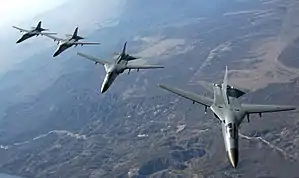
This is a list of the General Dynamics F-111 aircraft operated by the Royal Australian Air Force (RAAF) between 1973 and 2010. The RAAF's fleet of F-111s included 28 F-111Cs (of which four were converted to RF-111C reconnaissance aircraft) and 15 F-111Gs. Several more F-111s were purchased from the United States and used for ground training and testing purposes, or as a source of spare parts.
Background
The Australian Government purchased 24 F-111Cs in 1963.[1] These were completed during 1968 and early 1969, and the first of the RAAF's aircraft was handed over to the service on 4 September 1968. However, the entire fleet was grounded in the United States shortly afterwards while serious deficiencies with the F-111's design were corrected. The RAAF finally accepted the 24 aircraft during 1973, and they flew to Australia in four groups between 1 June and 4 December that year.[1][2]
Four of the F-111Cs were modified to RF-111C reconnaissance aircraft. The first, A8-126, received these modifications in the United States between October 1979 and April 1979; the other three were converted in Australia between July and September 1980.[3]
The RAAF purchased four ex-United States Air Force (USAF) F-111As in 1981 as attrition replacements. These aircraft were delivered to the service in 1982 and were subsequently converted to F-111C standard.[1]
In 1992 the Australian Government decided to purchase up to 18 ex-USAF F-111Gs in order to extend the type's service life. 15 F-111Gs were eventually acquired, and they were delivered to the RAAF during late 1993 and early 1994.[1][4] Three more ex-USAF F-111Gs were also held for Australia in the United States, but never delivered.[5] Other ex-USAF F-111s were also held at the 309th Aerospace Maintenance and Regeneration Group (AKA The Boneyard) in Arizona as sources of spare parts for the RAAFs fleet of aircraft.[6]
The Australian Government announced on 7 November 2003 that the RAAF's F-111s would be retired from 2010, and on 16 March 2007 it was announced that the type would be withdrawn by the end of 2010.[7] The F-111Gs were retired before the F-111Cs, with the last leaving service on 3 September 2007.[8] The F-111C fleet was drawn down, and the type was finally retired on 3 December 2010.[9] Eight of the RAAF's F-111s (seven F-111Cs and one F-111G) were destroyed in crashes during the type's service, with ten airmen being killed.[10]
Following the F-111s' retirement, 13 of the surviving aircraft (12 F-111Cs and a single F-111G) were preserved in aviation museums and RAAF air bases. The remaining aircraft were buried at the Swanbank landfill site outside of Ipswich, Queensland, between 21 and 23 November 2011.[11]
Aircraft
| Variant | RAAF serial number | Delivery/acceptance | Fate[12] | Comments | Image |
|---|---|---|---|---|---|
| F-111A | N/A | January 1995[12] | Buried 22 November 2011 | Ex-USAF aircraft used as a training aid. USAF serial 63-9768[12] | |
| F-111A | N/A | November 1999[13] | Tested to destruction by the DSTO, with the teardown of the airframe being completed in late 2003[14] | Purchased for airframe testing purposes[13] USAF serial 67-0106[12] | |
| F-111A | N/A | N/A | ? | Stored at the 309th Aerospace Maintenance and Regeneration Group in the US for possible RAAF use from 1981[13] USAF serial 67-0108[15] | |
| F-111A/C | A8-109 | 13 August 1982[15] | Preserved at the Historical Aircraft Restoration Society | Final F-111 to shut down its engines.[16] | 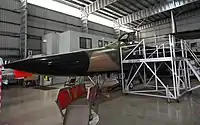 |
| F-111A/C | A8-112 | 13 August 1982[15] | Buried 23 November 2011 Fin and rudder preserved at RAAF Base Amberley | ||
| F-111A/C | A8-113 | 1982[15] | Preserved at the Australian Aviation Heritage Centre | _JP440552.jpg.webp) | |
| F-111A/C | A8-114 | 1982[15] | Buried 24 November 2011 Fin and rudder preserved at RAAF Base Amberley | ||
| F-111C | A8-125 | 16 March 1973[2] | Preserved at the RAAF Museum | First F-111C to arrive in Australia, and final aircraft to land at the type's retirement ceremony[9] | 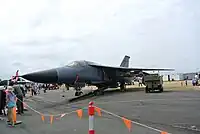 |
| F-111C/RF-111C | A8-126 | 6 September 1968 & 6 April 1973[2] | Preserved at the RAAF Amberly Aviation Heritage Centre | Accepted in 1968, but grounded while major structural problems with the F-111s were resolved. Accepted for a second time in 1973.[17] Prototype RF-111C, converted to this variant between October 1978 and April 1979[18] |  |
| F-111C | A8-127 | 6 April 1973[2] | Destroyed in a crash at Guyra, New South Wales on 13 September 1993 Both aircrew killed[10] | 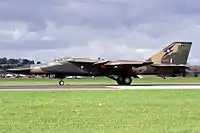 | |
| F-111C | A8-128 | 30 April 1973[2] | Destroyed in a crash at Tenterfield, New South Wales on 2 April 1987 Both aircrew killed[10] | ||
| F-111C | A8-129 | 18 April 1973[2] | Preserved at the Queensland Air Museum | 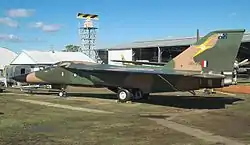 | |
| F-111C | A8-130 | 27 April 1973[2] | Preserved at the Pacific Aviation Museum Pearl Harbor |  | |
| F-111C | A8-131 | ? 1973[2] | Buried 23 November 2011 Crew escape module preserved at the Australian National Aviation Museum | 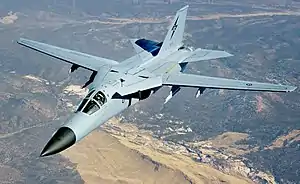 | |
| F-111C | A8-132 | 8 May 1973[2] | Preserved at the South Australian Aviation Museum | ||
| F-111C | A8-133 | 27 July 1973[2] | Destroyed in a crash at Evans Head, New South Wales on 29 September 1977 Both aircrew killed[10] | ||
| F-111C/RF-111C | A8-134 | 8 June 1973[2] | Preserved at the Australian War Memorial[19] | Converted to RF-111C during 1980[18] | .jpg.webp) |
| F-111C | A8-135 | 29 June 1973[2] | Buried 23 November 2011 Crew escape module preserved at the Caboolture Warplane Museum | 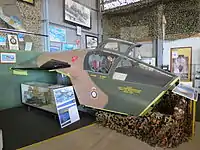 | |
| F-111C | A8-136 | 27 July 1973[2] | Destroyed in a crash at Armidale, New South Wales on 28 April 1977 Both aircrew survived[10] | ||
| F-111C | A8-137 | ? 1973[2] | Destroyed in a crash at RNZAF Base Ohakea on 24 August 1979 Both aircrew survived[10] | Crew escape module, rudder and fin preserved at the Amberley Aviation Heritage Centre | |
| F-111C | A8-138 | 26 July 1973[2] | Gate guardian at RAAF Base Amberley | 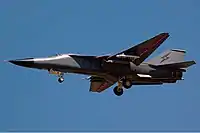 | |
| F-111C | A8-139 | ? 1973[2] | Crashed into the sea and destroyed off Moruya, New South Wales on 28 January 1986 Both aircrew killed[10] | ||
| F-111C | A8-140 | 3 August 1973[2] | Buried 24 November 2011 Crew escape module preserved at the Aviation Heritage Museum, Fin and rudder preserved at RAAF Base Amberley | ||
| F-111C | A8-141 | ? 1973[2] | Crashed into Auckland Harbour and destroyed on 25 October 1978. Both aircrew survived[10] | Crew escape module preserved at RAAF Base Amberley | 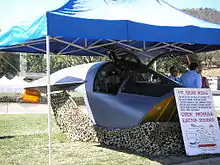 |
| F-111C | A8-142 | 22 August 1973[2] | Preserved at RAAF Base Wagga | 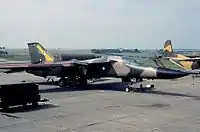 | |
| F-111C/RF-111C | A8-143 | 6 September 1973[2] | Buried 24 November 2011 Fin and rudder preserved at RAAF Base Amberley | Modified to RF-111C standard in 1980[18] Suffered damage in a belly landing at Amberley on 18 July 2006 and never repaired[12] | 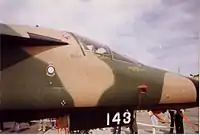 |
| F-111C | A8-144 | 18 September 1973[2] | Buried 23 November 2011 | Carried special "city of Ipswitch" scheme on tail and forward section | 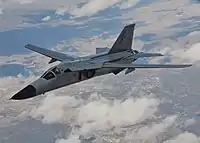 |
| F-111C | A8-145 | 27 September 1973[2] | Buried 23 November 2011 | Repair of Fatigue crack in lower wing during 1996. The fatigue crack was a chordwise 48 mm crack in the critical, non-failsafe, port lower wing skin at approximately 2/3 semi span. The crack had reduced the wing's residual strength to below Design Limit Load and the repair was therefore critical. | |
| F-111C/RF-111C | A8-146 | ? 1973[2] | Buried 24 November 2011 Reconnaissance pallet donated to the Australian War Memorial, fin and rudder preserved at RAAF Base Amberley | Modified to RF-111C standard in 1980[18] | 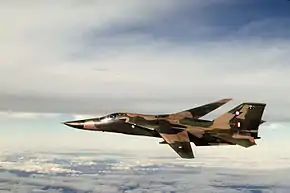 |
| F-111C | A8-147 | 26 October 1973[2] | Preserved at the Evans Head Memorial Aerodrome | 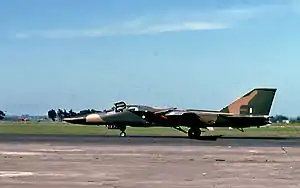 | |
| F-111C | A8-148 | 4 December 1973[2] | Preserved at Fighter World, RAAF Base Williamtown | .jpg.webp) | |
| F-111G | A8-259 | ? | Buried 22 November 2011 | ||
| F-111G | A8-264 | ? | Buried 23 November 2011 | ||
| F-111G | A8-265 | ? | Buried 21 November 2011 | ||
| F-111G | A8-270 | ? | Buried 22 November 2011 | ||
| F-111G | A8-271 | ? | Buried 23 November 2011 | ||
| F-111G | A8-272 | ? | Preserved at the RAAF Museum | Nicknamed "The Boneyard Wrangler",[12] as it was revived from a USAF graveyard salvaging parts from various other F-111s. Only Complete F-111G in Australia to be preserved | 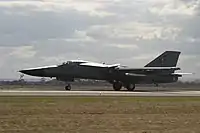 |
| F-111G | A8-274 | ? | Buried 23 November 2011 | .jpg.webp) | |
| F-111G | A8-277 | ? | Buried 21 November 2011 | ||
| F-111G | A8-278 | ? | Buried 22 November 2011 | ||
| F-111G | A8-281 | ? | Buried 22 November 2011 | ||
| F-111G | A8-282 | ? | Buried 23 November 2011 | ||
| F-111G | A8-291 | ? | Destroyed in a crash on Pulau Aur, Malaysia on 18 April 1999 Both aircrew killed[10] | ||
| F-111G | A8-506 | ? | Buried 22 November 2011 | ||
| F-111G | A8-512 | ? | Buried 23 November 2011 Fin and rudder preserved at RAAF Base Amberley. Fin on display at entrance to HQJOC. | ||
| F-111G | A8-514 | ? | Buried 22 November 2011 | ||
| FB-111A | N/A | ? | On display at the Fleet Air Arm Museum since November 2014 | The forward section only of the ex-USAF FB-111A 68-0246 was acquired by the RAAF as a recruitment aid[20] |  |
See also
References
- Citations
- 1 2 3 4 "A8 General Dynamics F-111". RAAF Museum. Retrieved 30 March 2014.
- 1 2 3 4 5 6 7 8 9 10 11 12 13 14 15 16 17 18 19 20 21 22 23 24 25 Lax (2010), p. 111
- ↑ Lax (2010), pp. 140-141
- ↑ Lax (2010), p. 205
- ↑ Lax (2010), p. 203
- ↑ "General Dynamics F-111A/C/G and RF-111C".
- ↑ Lax (2010), pp. 234-235
- ↑ Lax (2010), p. 204
- 1 2 "F-111 flies into history". Australian Aviation. 3 December 2010. Retrieved 30 March 2014.
- 1 2 3 4 5 6 7 8 9 Lax (2010), p. 135
- ↑ Cuskelly (2014), pp. 26, 29-30
- 1 2 3 4 5 6 Cuskelly (2014), p. 29
- 1 2 3 Lax (2010), p. 162
- ↑ Lax (2010), p. 214
- 1 2 3 4 5 Lax (2010), p. 163
- ↑ Huntsdale, Justin (27 November 2019). "Aviation fanatic dusts off retired F-111, one of Australia's most important fighter bombers". ABC News. Retrieved 27 November 2019.
- ↑ "F-111". RAAF Amberley Aviation Heritage Centre. Retrieved 23 March 2014.
- 1 2 3 4 Lax (2010), p. 141
- ↑ "Australian War Memorial to add RF-111C to its collection". Australian Aviation. 20 April 2018. Retrieved 21 April 2018.
- ↑ Crick, Darren; Edwards, Martin. "RAAF A8 General Dynamics F111C/G & RF111C". ADF-Serials. Retrieved 15 March 2015.
- Works consulted
- Cuskelly, Ron (April–June 2014). "Preserving the Pig". Aero Australia (42): 22–30.
- Lax, Mark (2010). From Controversy to Cutting Edge: A History of the F-111 in Australian Service. Canberra: Air Power Development Centre. ISBN 9781920800543. Archived from the original on 30 May 2012.